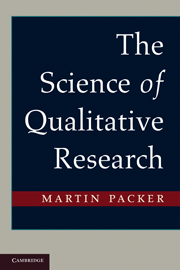Book contents
- Frontmatter
- Contents
- List of Figures and Tables
- List of Boxes
- Acknowledgments
- Introduction
- Part I The Objective Study Of Subjectivity
- Part II Ethnographic Fieldwork – The Focus On Constitution
- 6 Calls for Interpretive Social Science
- 7 Dualism and Constitution
- 8 Constitution as Ontological
- 9 The Crisis in Ethnography
- 10 Studying Ontological Work
- Part III Inquiry With An Emancipatory Interest
- References
- Name Index
- Subject Index
7 - Dualism and Constitution
The Social Construction of Reality
- Frontmatter
- Contents
- List of Figures and Tables
- List of Boxes
- Acknowledgments
- Introduction
- Part I The Objective Study Of Subjectivity
- Part II Ethnographic Fieldwork – The Focus On Constitution
- 6 Calls for Interpretive Social Science
- 7 Dualism and Constitution
- 8 Constitution as Ontological
- 9 The Crisis in Ethnography
- 10 Studying Ontological Work
- Part III Inquiry With An Emancipatory Interest
- References
- Name Index
- Subject Index
Summary
Edit and interpret the conclusions of modern science as tenderly as we like, it is still quite impossible for us to regard man as the child of God for whom the earth was created as a temporary habitation. . . . Man is but a foundling in the cosmos, abandoned by the forces that created him. Unparented, unassisted and undirected by omniscient or benevolent authority, he must fend for himself, and with the aid of his own limited intelligence find his way about in the indifferent universe. Such is the world pattern that determines the character and direction of modern thinking.
Becker, 1932/1961, pp. 14–15It seems common sense that each of us has a mind in which we construct conceptions of the world around us. Our “subjectivity” is not merely ideas in our heads; it is the way the whole world appears to us. The “mental” is taken to be something inner, personal, and subjective. In addition, an information-processing model is accepted throughout the social sciences. In this model, the brain is seen as a computer, actively processing data received through the sensory organs, forming complex internal models or theories about the external world, and deciding how to act on the basis of these models. This, too, has come to seem obvious and natural.
The problems with such views are not so obvious, but humans have not always thought about themselves in this way. Of course, no single person could be responsible for such a model, but one person in particular was a highly influential spokesperson: the 18th-century German philosopher Immanuel Kant. Although he wrote over 200 years ago, many still consider Kant the most important philosopher of all time. The accusation of dualism is usually directed toward Descartes (e.g., Burwood, Gilbert, & Lennon, 1999), but the model of human being that the social sciences assume, and the dualisms in which they have become caught, are due much more to Kant. This chapter explores Kant and his influence in order to see how this model arose and why, and how it both requires a process of “constitution” and trivializes this as something individual, primarily cognitive and intellectual.
- Type
- Chapter
- Information
- The Science of Qualitative Research , pp. 140 - 166Publisher: Cambridge University PressPrint publication year: 2010



